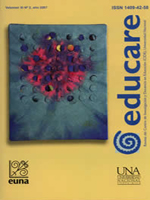Conexión entre la escuela y otras instituciones de la comunidad
DOI:
https://doi.org/10.15359/ree.11-2.7Keywords:
School, community, educational processAbstract
Abstract. The school is one of many institutions belonging to the state; therefore, it cannot be considered as isolated, although some people think this way. The relations between the school and other institutions in the community enrich the educational process.They make it more dynamic and pleasant. This article discusses the ways to take advantage of the links between the different institutions of a community and the school and this as the key to prepare children and young people to confront and develop, successfully, their social, educational, political, economical and religious role.
References
Cárdenas, M. ( 1990). Antología para el curso Escuela y comunidad. ( 1 ª Reimpres ). San José, Costa Rica: EUNED.
Cassany, D. (1999). Desde lo cotidiano. Disponible en: http://www.cep.edu.uy/RedDeEnlace/TizayPizarron/RevMtros l 99b.htm
García, V y Medina, R. (1987). Organización y gobierno de centros educativos. Madrid: EDITORJAL RJALP.
Romero, R. (s.f.). La educación y la escuela en el banquillo. Opiniones y notas de FLATEC (Federación Latinoamericana de Trabajadores de la Educación y la Cultura). Disponible en: http://www.flatec.org/notas/opiniones/opinión_ 6htm
Relaciones entre la escuela y otras instituciones de la comunidad (Feb. 2004). Encuesta realizada a diez directores de escuelas públicas y privadas.
Published
How to Cite
Issue
Section
License
1. In case the submitted paper is accepted for publication, the author(s) FREELY, COSTLESS, EXCLUSIVELY AND FOR AN INDEFINITE TERM transfer copyrights and patrimonial rights to Universidad Nacional (UNA, Costa Rica). For more details check the Originality Statement and Copyright Transfer Agreement
2. REUTILIZATION RIGHTS: UNA authorizes authors to use, for any purpose (among them selfarchiving or autoarchiving) and to publish in the Internet in any electronic site, the paper´'s final version, both approved and published (post print), as long as it is done with a non commercial purpose, does not generate derivates without previous consentment and recognizes both publisher's name and authorship.
3. The submission and possible publication of the paper in the Educare Electronic Journal is ruled by the Journal’s editorial policies, the institutional rules of Universidad Nacional and the laws of the Republic of Costa Rica. Additionally, any possible difference of opinion or future dispute shall be settled in accordance with the mechanisms of Alternative Dispute Resolution and the Costa Rican Jurisdiction.
4. In all cases, it is understood that the opinions issued are those of the authors and do not necessarily reflect the position and opinion of Educare, CIDE or Universidad Nacional, Costa Rica. It is also understood that, in the exercise of academic freedom, the authors have carried out a rogorous scientific-academic process of research, reflection and argumentation thar lays within the thematic scope of interest of the Journal.
5. The papers published by Educare Electronic Journal use a Creative Commons License:














 The articles published by Educare Electronic Journal can be shared with a Creative Commons License:
The articles published by Educare Electronic Journal can be shared with a Creative Commons License: 



